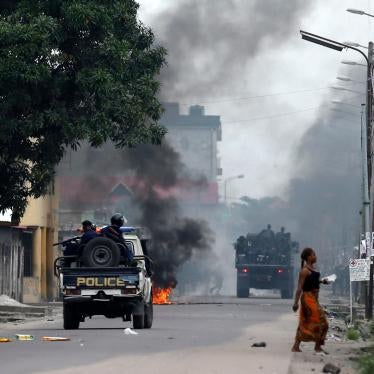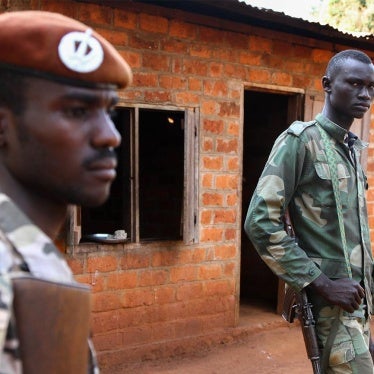(New York) - The United Nations Security Council should maintain the arms embargo against the Liberian government, Human Rights Watch said in releasing a new report about abuses in Liberia today.
Human Rights Watch also called for the arms embargo to be extended to cover the rebel Liberians United for Reconciliation and Democracy (LURD), and for an end to Guinea’s support for the LURD. The U.N. Security Council is expected to vote on the arms embargo by May 7.
The 23-page report, “Back to the Brink: War Crimes by Liberian Government and Rebels, A Call for Greater International Attention to Liberia and the Sub Region” provides compelling evidence that Liberian government forces fighting against the LURD are committing war crimes and other serious human rights abuses against civilians in the northwest of the country.
“Liberian civilians are once again bearing the brunt of a brutal war,” said Peter Takirambudde, executive director of Human Rights Watch’s Africa division. “If the international community does not prevent further bloodshed, Liberia’s war will destabilize the wider region.”
The Liberian army and government militias have executed scores of civilians, including dozens whom they confined to houses and later burned to death. They have also carried out widespread rape of women and girls, some as young as twelve, and systematically looted and burned villages. Hundreds of men and some boys have been forcibly conscripted and sent to the battlefront in an arbitrary manner, often without proper training. LURD forces, which first attacked in July 2000, have also carried out serious abuses, although to a lesser extent, including summary executions of alleged government collaborators, rape, and forced recruitment, including of children.
Takirambudde said the fragile peace in Sierra Leone could easily be upset as a result of spillover from the renewed Liberian war, as growing numbers of Liberian refugees and combatants cross into neighboring countries. With peace coming to Sierra Leone, hundreds of former fighters from all sides of Sierra Leone’s civil war are crossing into Liberia to fight as mercenaries either for the Liberian government or for LURD.
Human Rights Watch also expressed concern at the destabilizing role the government of Guinea is playing in providing logistic and some military support to the LURD. The United States, which will begin dispensing U.S.$3 million in military assistance to Guinea in May 2002, should condition its aid on an end to Guinea’s assistance for rebel activity in Liberia, Human Rights Watch said.
Over the past decade, the governments of the Mano River Union—Liberia, Sierra Leone, and Guinea—have frequently harbored each other’s rebel groups and supported cross-border incursions, causing widespread instability. Charles Taylor, both as former warring faction leader and as president of Liberia since 1997, bears primary responsibility for much of the long-standing aggression and serious human rights abuses in the sub-region, both in Liberia and in particular through his support for the Revolutionary United Front (RUF) rebels in Sierra Leone.
In the face of renewed rebel action and negative international publicity, the Taylor government, which took power after a seven-year civil war, has become increasingly intolerant of dissent. Since a state of emergency was imposed in February 2002, the government has carried out a spate of arrests, closed newspapers, and detained and tortured human rights activists, clearly to silence criticism. Citing the rebel threat, the government is remilitarizing society—remobilizing ex-combatants and proliferating militia groups.
Human Rights Watch said that the international community must act immediately to pressure the Liberian government and rebels to respect human rights, and take steps to end Guinea’s support to the Liberian rebels





